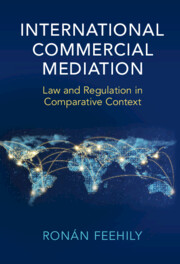Book contents
- International Commercial Mediation
- International Commercial Mediation
- Copyright page
- Dedication
- Contents
- Preface
- Foreword
- Cases
- Statutes
- International Conventions, Laws, Codes and Rules
- 1 Introduction to Commercial Mediation
- 2 Commercial Mediation in the International Context
- 3 Agreements for Future Mediation
- 4 Approaches to Mediation
- 5 Mediators and Their Appointment
- 6 Lawyers and Other Professional Mediation Supporters
- 7 Conduct and Costs
- 8 Mediated Settlement Agreements
- 9 Confidentiality
- 10 Process Controversies
- Bibliography
- Index
6 - Lawyers and Other Professional Mediation Supporters
Published online by Cambridge University Press: 01 September 2022
- International Commercial Mediation
- International Commercial Mediation
- Copyright page
- Dedication
- Contents
- Preface
- Foreword
- Cases
- Statutes
- International Conventions, Laws, Codes and Rules
- 1 Introduction to Commercial Mediation
- 2 Commercial Mediation in the International Context
- 3 Agreements for Future Mediation
- 4 Approaches to Mediation
- 5 Mediators and Their Appointment
- 6 Lawyers and Other Professional Mediation Supporters
- 7 Conduct and Costs
- 8 Mediated Settlement Agreements
- 9 Confidentiality
- 10 Process Controversies
- Bibliography
- Index
Summary
Many jurisdictions require lawyers to advise clients about mediation. As gatekeepers of the process, lawyers have duties to fulfil before the mediation starts, during the process and when it ends. There are ethical considerations that mediators must consider and potential legal liability to bear in mind. While it is important to distinguish between acting as a lawyer and as a mediator to ensure there is no conflict of roles, the two roles can also have a symbiotic relationship. Observing the work of lawyers in mediation from a detached perspective is beneficial, as opportunities arise to see behaviours that are counter-productive and behaviours that are constructive. This acquaints a lawyer with a variety of ways to respond to difficult behaviours by clients or opposing counsel that can help in meeting the parties’ substantive needs. Mediation has been instrumental in the emergence of the ‘new lawyer’ – a professional who has a greater focus on the potential for interest-based bargaining and problem solving, and accepts the value of non-legal solutions to legal problems. The flexibility of the mediation process can also facilitate expert involvement in a non-adversarial way.
- Type
- Chapter
- Information
- International Commercial MediationLaw and Regulation in Comparative Context, pp. 140 - 161Publisher: Cambridge University PressPrint publication year: 2022



